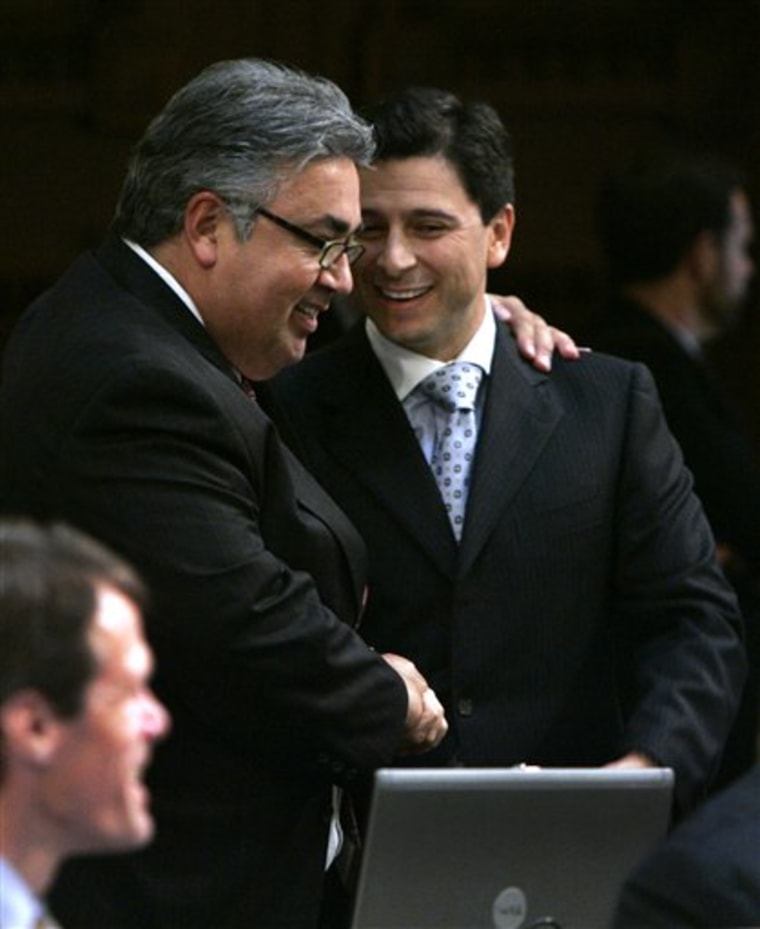California, always a leader in fashion and fads, is poised to become a national political trendsetter as well in 2008.
The decision to move up California's 2008 presidential primary by four months promises to make the most populous state something it hasn't been in decades - a potent player in picking White House nominees.
For years the state has been a place candidates visited mostly for one thing - money, sucked up in Hollywood or Silicon Valley. But with the primary about to move to Feb. 5, candidates are jostling for media attention, endorsements and donor checks with an intensity not seen in a generation.
Joining the 'National Primary' day
In recent days Rudy Giuliani pumped hands in San Diego, John Edwards told Los Angeles students to "change America," John McCain shared a stage with Gov. Arnold Schwarzenegger, and Hillary Rodham Clinton talked clean energy with Los Angeles Mayor Antonio Villaraigosa.
"In the past, California has only been the state where politicians come and pick your pockets," Democratic contender Bill Richardson, the New Mexico governor, said on a Los Angeles stop Wednesday.
"Now, California issues like protecting the environment, growth, traffic, water will be important," he predicted.
California's new clout is not assured. By rescheduling to Feb. 5 from June, California joins what McCain strategist John Weaver calls an emerging "national primary" - a day when as many as 19 states could hold presidential contests.
The cluster of Feb. 5 states could eventually include New York, Florida, Illinois and New Jersey, diluting what could otherwise be the impact of a standalone contest. Still, it brings California's rich prize of delegates much closer to the front, where it most counts, and the candidates are reaching out for it.
You'd have to go back to 1972 to find a presidential primary with make-or-break drama in California, says political scientist John Pitney of California's Claremont McKenna College. That year, Democrat George McGovern defeated former Vice President Hubert Humphrey, tightening his grip on the Democratic nomination.
The stakes on Feb. 5 will greatly magnify the importance of earlier contests in Iowa, Nevada, New Hampshire and South Carolina. Candidates who do well in those contests will be the obvious front-runners in the mega-primary that's forming.
"Those four early states will go a long way to deciding who wins on Feb. 5," said Democratic consultant Bill Carrick, who's worked on presidential campaigns for Bill Clinton, Dick Gephardt and Ted Kennedy and considers predictions of newfound California influence overstated.
"It's not realistic to think we are going to have a living room-style campaign like New Hampshire or Iowa," Carrick said.
Electoral vote value high
Weaver says California will see a lot of candidate traffic, but "some states are only going to get a slight peek at the candidates - there's no way people can try to cover all those bases."
But just tallying the number of candidates in the state this month makes clear many hope to collect delegates here. And the state's size - 16 million voters - along with the nation's biggest haul of electoral votes make California hard to ignore in a general election.
Democratic nominee John Kerry raised more than $31 million in California in the 2004 campaign, while President Bush raised more than $19 million, according to figures from the Center for Responsive Politics in Washington.
The Legislature has approved the Feb. 5 primary date, and Schwarzenegger is expected to sign it as soon as this week.
There are wrinkles in campaigning in Democratic-leaning California that make the state both attractive and daunting for candidates, well-known or not.
Cherry picking voters, hunting for endorsements
It's an expensive media market - a week of statewide TV ads can cost $2 million or more - and candidates must raise ever more cash to be visible.
And California Republicans, unlike Democrats, allow only registered party members to vote in the presidential primary, meaning candidates like McCain and Giuliani who appeal to unaffiliated voters would be cut off from a pool of 3 million potential supporters. In San Francisco, for example, three of 10 voters are unaffiliated. Statewide, nearly two of 10 voters are not aligned with a party.
That would force candidates to appeal to the generally more conservative Republicans who traditionally turn out in party primaries.
Under the California system, a Democrat can qualify for a delegate by winning at least 15 percent of the vote in a congressional district. Republicans, however, award delegates only to the top vote-getter in each district, which means GOP candidates can concentrate on districts where they see the best chance of winning - the coastal areas tend to lean left, the inland areas right.
"It certainly allows for campaigns ... to try to cherry pick" voters, says Weaver.
Schwarzenegger and Villaraigosa have been sought out by candidates from their respective parties, all eager to take advantage of their popularity and ability to draw TV cameras. Neither has shown any indication he will make an endorsement in the primary.
GOP candidates carried the state in six successive presidential elections beginning in 1968. But California has voted for a Democratic president since 1992.
"California is the big enchilada in American politics," says Weaver, the McCain strategist. "It always has been in a general-election sense. The move to Feb. 5 makes that the case in both primaries."
